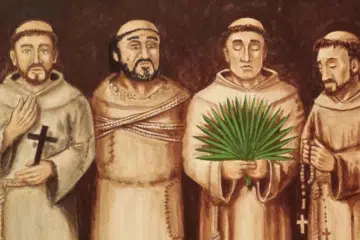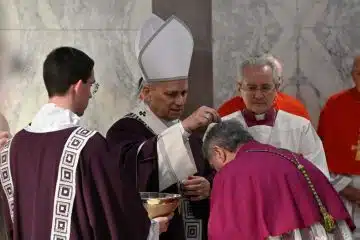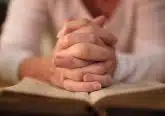The Redemption of the Body Part 3

Note: This article is part of an ongoing series on Pope St. John Paul II’s “Theology of the Body.”
Over the last few months, we have been pondering Pope St. John Paul II’s thoughts on the “redemption of the body.” This concept is essential to the late pope’s thought because, in his own words, “everything” he taught about the human person in Theology of the Body (TOB) “has its definitive foundation in the mystery of the redemption of the body” (86.8). The pope used this phrase from St. Paul’s Letter to the Romans to refer to the complete healing, restoring, and elevation of the whole human person. Redemption is ultimately about victory over bondage to sin. As we saw last time, this victory simultaneously has been achieved by Christ through His Death and Resurrection, is being achieved day- by-day in our own lives, and will be achieved definitively at the resurrection of the body when Christ comes again.
In particular, Pope St. John Paul II emphasized that the term “redemption of the body” applies to “historical man,” that is, to you and me. It means that we are all called to cooperate with Christ in the here-and-now to achieve victory over sin and concupiscence, “even in the exclusively inner movements of the human heart” (TOB 86.6). Christ’s words in the gospels give us hope that with Him such victory is possible. Pope St. John Paul II referred to this “hope of victory over sin” as “the hope of the everyday” (86.6). He went on to say, “In his everyday life, man must draw from the mystery of the redemption of the body the inspiration and strength to overcome the evil that is dormant in him” (86.7).
We do this by answering Jesus’ daily call “to discover and strengthen the bond that exists between the dignity of the human being … and the spousal meaning of his body” (86.8). This means learning again and again to see the personal dignity of every human body and refusing to look at another’s body as a mere object for my gratification. Doing so enables us “to understand and bring about the mature freedom of the gift [of self ], which expresses itself in one way in indissoluble marriage and in another by abstaining from marriage for the kingdom of God” (86.8).
While all are called to pursue the redemption of the body in this way, the specific focus will depend on our state of life: “Man and woman, bound in marriage, must daily undertake the task of the indissoluble union of the covenant they made with each other” whereas “men and women who have voluntarily chosen continence for the kingdom of heaven must give a daily living witness of faithfulness to such a choice” (86.7). In either state, “what is at stake is the hope of everyday, which in the measure of normal tasks and difficulties of human life helps to overcome ‘evil with good’” (86.7).
In TOB, Pope St. John Paul II showed that Catholic teaching on sexual morality is not an abstract ideal or an unrealistic, impossible norm imposed on us. It corresponds to the very structure of our human nature and is a precious gift given to us by Christ for our freedom. Indeed, it is the only way to live a truly human life. Victory over sin is not only possible, it is essential, and it is worth it.
To be sure, pursuing the redemption of the body imbued by the hope of the everyday entails suffering. Every time we say “no” to a disordered desire that arises in our hearts, it feels like a death, but doing so out of love and obedience to Christ unites our death with His and opens us to resurrection and the new life of the Spirit. As we continually say “yes” to the grace being offered to heal our hearts and we tirelessly work with Christ and the Holy Spirit to rid ourselves of sin, we are strengthened by the knowledge of Christ’s victory and by the sure hope of the final resurrection so that with St. Paul we can say “that the sufferings of this present time are not worth comparing with the glory that is to be revealed to us.” As John Paul II reminded us, “The hope of everyday shows its power in human works and even in the very movements of the human heart, clearing a path … for the great eschatological hope tied to the redemption of the body” (86.7). ✣
Dr. Andrew Sodergren is a Catholic psychologist and director of psychological services for Ruah Woods. He speaks on the integration of psychology and the Catholic faith. He and his wife, Ellie, have five children.
This article appeared in the September 2025 edition of The Catholic Telegraph Magazine. For your complimentary subscription, click here.













